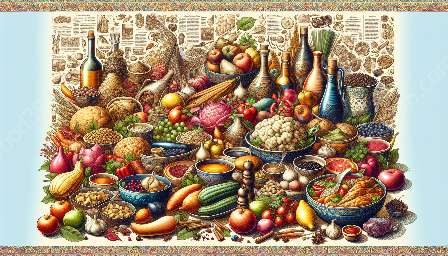Ancient Mesopotamia, often referred to as the cradle of civilization, was home to a rich and diverse culinary tradition that laid the foundation for many modern cooking techniques and food cultures. In this exploration, we will delve into the intriguing evolution of cooking techniques, tools, and the origin and evolution of food culture in this ancient civilization.
The Origins of Mesopotamian Cuisine
Mesopotamia, located in the region of modern-day Iraq, is renowned for being one of the earliest cradles of human civilization. The ancient Mesopotamians relied on the fertile land between the Tigris and Euphrates rivers to cultivate a variety of crops, including barley, wheat, dates, and a wide assortment of fruits and vegetables. This abundance of agricultural produce formed the cornerstone of their culinary traditions.
Evolution of Cooking Techniques and Tools
The evolution of cooking techniques in ancient Mesopotamia paralleled the development of tools and technologies that transformed the way food was prepared and consumed. Early Mesopotamian communities utilized open hearths for cooking, but as civilization progressed, they advanced to using clay ovens and large, communal kitchens that allowed for more sophisticated cooking methods, such as baking and stewing.
One of the most significant contributions of the Mesopotamians to culinary history was the invention of beer. They pioneered the brewing process, utilizing ingredients such as barley and water to create a fermented beverage that not only offered nourishment but also played a vital role in social and religious rituals.
Food Culture in Ancient Mesopotamia
Food and feasting held a central place in the social and cultural fabric of ancient Mesopotamia. The Mesopotamians placed great importance on hospitality and communal dining, often gathering for elaborate banquets and celebrations. These gatherings provided opportunities for the exchange of culinary knowledge and the showcasing of culinary skills.
Furthermore, the Mesopotamians developed a sophisticated system of food preservation, including drying, salting, and pickling, which allowed them to stockpile provisions for times of scarcity. This mastery of food preservation techniques helped sustain their civilization through challenging periods.
Influence on Future Food Cultures
The culinary innovations and gastronomic traditions of ancient Mesopotamia had a profound influence on the food cultures that followed. The techniques and recipes developed by the Mesopotamians were disseminated through trade and cultural exchange, shaping the culinary practices of neighboring regions and beyond.
Moreover, the organizational structure of large-scale food production in Mesopotamia foreshadowed the development of complex culinary traditions and food systems in subsequent civilizations. The legacy of Mesopotamian food culture can be seen in the culinary practices of the ancient Egyptians, Greeks, and Romans, as well as in the broader culinary heritage of the Middle East.
Conclusion
Exploring the ancient Mesopotamian culinary traditions offers a fascinating glimpse into the early stages of human food culture and the evolution of cooking techniques and tools. The rich heritage of Mesopotamian cuisine continues to inspire and influence culinary practices around the world, underscoring the enduring significance of this ancient civilization in the realm of gastronomy.


